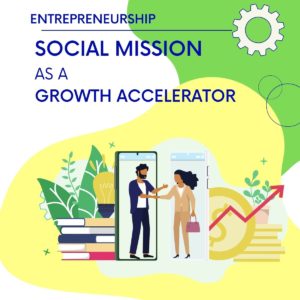Social Mission as a Start Up Growth Accelerator
Founders with a compelling social mission are inspirational. But can a purpose-based startup succeed in the marketplace? Some entrepreneurs who focus on growing a profitable business may be tempted to put social impact on the back burner. That’s a mistake. Leading with purpose provides startups with a competitive advantage. Here’s how a social mission becomes a growth accelerator:
–As a LAUNCH PROPELLANT: Purpose-based startups are attractive to prospective founding team members and customers as well as to social impact investors. A 2019 survey of US consumers reported that 77% were motivated to purchase from companies that are committed to making the world a better place, and 73% of investors said that whether or not corporations are prioritizing programs to improve the environment and contribute to society was an important factor in their investment decisions.
–As a TALENT MAGNET: Finding and keeping top talent is essential for growth, and social purpose gives startups an edge.
In a 2020 workforce survey by Porter Novelli, 93% of employee respondents stated that companies must lead with a social purpose, and almost 70% said they do not want to work for a company that lacks a strong and positive social purpose.
–As a PARTNERSHIP CATALYST: The shared vision of a planet-friendly, cruelty-free vegan restaurant chain enabled Jeffrey Harris to bring together like-minded co-founders, early-stage investors, and franchise licensees to support the Plant Power Fast Food social mission. Since 2016, these mission-aligned partners have opened 11 restaurant locations and a food truck, and attracted over $7.5 million in outside funding.
Paul Tasner’s vision to replace planet-polluting plastic with recycled green packaging took off when he partnered with manufacturers who agreed to defer payment to support Paul’s sustainability mission These partnerships allowed PulpWorks to scale its customer base and revenues, turning a social impact startup into a profitable company that’s still going strong a decade after its launch in 2011.
These data and companies are from my book, Starting Up Smarter. There are many more founders who have turned their social mission into a growth accelerator. I hope you will share your own examples with me on LinkedIn
